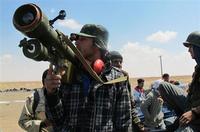-
Justice Department endorses NYPD’s stop-and-frisk

The Justice Department (DOJ) has entered the debate on the New York Police Department’s stop-and-frisk policy, telling a federal judge that DOJ endorses the program as long as there is independent oversight to monitor changes in the policy if civil rights violations occur.
-
-
U.S. confirms: Assad used chemical weapons against Syrian rebels, civilians
The Obama administration has informed Congress a few minutes ago that the U.S. intelligence community has determined that the Assad regime has used chemical weapons on several occasions against both rebel forces and Syrian civilians. The U.S. intelligence community says these attacks, each using small quantities of sarin gas, have killed about 150 Syrians.
-
-
NSA director: surveillance programs prevented “dozens” of terror attacks
Gen. Keith Alexander, the director of the National Security Agency (NSA) and commander of the U.S. Cyber Command, told lawmakers yesterday (Wednesday) that the NSA’s electronic surveillance programs have been indispensable in thwarting “dozens” of terrorist attacks on targets in the United States and abroad. He told the senators that securing a “cyber arena” could be done without infringing upon the privacy rights of Americans. “We do not see a tradeoff between security and liberty,” Alexander said, later adding, “We are trying to protect Americans.”
-
-
Al Qaeda-affiliated militants training in using shoulder-fired anti-aircraft missile

A Xerox copy of a 26-page manual with instructions on how to use man-portable air-defense systems, or MANPADS – also called SA-7 — was found in a building in Timbuktu in North Mali which was used by Al Qaeda in the Islamic Maghreb operatives during the 8-month control – April 2012 to February 2013 — of the area by Islamist militants. The Libyan military under Col. Qaddafi had about 15,000 SA-7s, but after the Qaddafi regime fell in November 2011, NATO forces and Libyan militias loyal to the government gained possession of only 5,000 of them. The rest have disappeared into the arsenals of different militias, and have probably found their way to different terrorist organizations in North Africa and the Middle East.
-
-
ACLU files lawsuit challenging NSA's phone surveillance
In the wake of the past week’s revelations about the NSA’s surveillance of phone calls, the yesterday American Civil Liberties Union (ACLU) filed a lawsuit charging that the program violates Americans’ constitutional rights of free speech, association, and privacy.
-
-
Responding to public health emergencies

Over the past decade, community engagement has become a central tenet of U.S. federal approach to public health emergency preparedness. Little is known, however, about how the vision of a ready, aware, and involved populace has translated into local practice.
-
-
Making jet fuel from switchgrass

The Energy Department’s National Renewable Energy Laboratory (NREL) is partnering with Cobalt Technologies, U.S. Navy, and Show Me Energy Cooperative to demonstrate that jet fuel can be made economically and in large quantities from a renewable biomass feedstock such as switch grass. The project could spur jobs in rural America, lead to less reliance of foreign oil.
-
-
White House to conduct urgent, comprehensive review of U.S. Syria policy
The White House today and tomorrow is conducting an urgent, and comprehensive, review of U.S. Syria policy, with a major policy announcement expected Wednesday or Thursday. The urgency is the result of changes on the battlefield. Bolstered with thousands of Hezbollah fighters, growing financial support from Iran and Iraq, around-the-clock arms shipments from Iran and Syria, and more direct Iranian involvement in overseeing the regime’s military operations, the Assad government has been able to turn the tide of war in its favor. Senior administration officials believe that arming the rebels may no longer be sufficient to reverse the Assad government’s gains unless the United States takes additional, and more direct, steps like carrying out airstrikes against Syrian forces.
-
-
Social media analytics help emergency responders
If you think keeping up with what is happening via Twitter, Facebook, and other social media is like drinking from a fire hose, multiply that by seven billion — and you will have a sense of what researchers who are working on SALSA (SociAL Sensor Analytics) are facing. Efforts of emergency responders and public health advocates could be boosted by SALSA.
-
-
Edward Snowden, an NSA contractor employee, says he is the source of NSA leaks
Edward Snowden, a 29-year-old former technical assistant in the CIA and more recently an employee of the defense contractor Booz Allen Hamilton, has identified himself as the source of the leaks about three massive NSA surveillance schemes. Snowden says the NSA’s surveillance activities are all-consuming; these activities “are intent on making every conversation and every form of behavior in the world known to [the NSA].” He said that once he concluded that the NSA’s surveillance scheme would soon be irrevocable, it was just a matter of time before he chose to act. “What they’re doing” poses “an existential threat to democracy,” he said.
-
-
Second NSA domestic surveillance scheme revealed: data mining from nine U.S. ISPs

A day after it was revealed that the NSA was collecting communication information on millions of Verizon’s U.S. customers, another NSA domestic surveillance scheme was exposed: the NSA and the FBI have been tapping directly into the central servers of nine leading U.S. Internet service providers for the purpose of harvesting audio, video, photographs, e-mails, documents, and connection logs. The information collected allowed intelligence analysts to track an individual’s movements and contacts over time.
-
-
Nevada lawmakers fail to restore DHS funds to Las Vegas
Members of the Nevada congressional delegation were taken aback when they found that Las Vegas would lose DHS funding for anti-terror programs, and immediately began to work their fellow lawmakers on the Hill to add money to DHS security grants to cities. The effort failed, and Las Vegas will have to find other sources of funding for some of the city’s security programs.
-
-
Studying rare Earth elements in Alaska may help make them less rare
A unique deposit of heavy rare Earth elements (REE) at Alaska’s Bokan Mountain could help scientists understand how rare Earth element deposits form, according to new research. Rare Earth elements are important, but scarce, elements used in components in many cutting edge electronic and defense technologies.
-
-
Better weather predictions for the U.S. Navy
In a development that should significantly affect fleet operations, the U.S. Navy has adopted a new global weather forecasting model. The Naval Global Environmental Model (NAVGEM)could inform Navy operations for years to come. It is particularly important as U.S. fleet presence increases throughout the Asia-Pacific region, known for intense weather events like typhoons.
-
-
NSA collecting information on Verizon customers’ communications
The National Security Agency (NSA) has been collecting massive amounts of “metadata,” or transactional information, on millions of Verizon’s U.S. customers. A court granted the NSA permission to begin information collection on 25 April, stipulating the collection must end by 19 July. The court order instructs Verizon to “continue production on an ongoing daily basis thereafter for the duration of this order.” It specifies that the records to be produced include “session identifying information,” such as “originating and terminating number,” the duration of each call, telephone calling card numbers, trunk identifiers, International Mobile Subscriber Identity (IMSI) number, and “comprehensive communication routing information.”
-
More headlines
The long view
Factories First: Winning the Drone War Before It Starts
Wars are won by factories before they are won on the battlefield,Martin C. Feldmann writes, noting that the United States lacks the manufacturing depth for the coming drone age. Rectifying this situation “will take far more than procurement tweaks,” Feldmann writes. “It demands a national-level, wartime-scale industrial mobilization.”
How Male Grievance Fuels Radicalization and Extremist Violence
Social extremism is evolving in reach and form. While traditional racial supremacy ideologies remain, contemporary movements are now often fueled by something more personal and emotionally resonant: male grievance.
The Surprising Reasons Floods and Other Disasters Are Deadlier at Night
It’s not just that it’s dark and people are asleep. Urban sprawl, confirmation bias, and other factors can play a role.
Why Flash Flood Warnings Will Continue to Go Unheeded
Experts say local education and community support are key to conveying risk.
